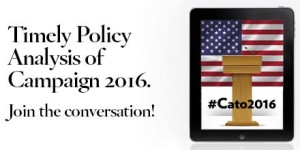“My own anecdote about Justice Scalia is that he once hired me for my dream job because I wouldn’t stop arguing with him.” I set down a few recollections about the great man which are up now at The Daily Beast.
The dream job in question was to help with the editing of Regulation magazine, which in its early years was a project of the American Enterprise Institute (it’s at Cato now). I remember well the magazine’s publication of the classic debate between Antonin Scalia and Richard Epstein on the proper role of the courts in protecting economic liberty, itself based on an “Economic Liberties and the Constitution” conference sponsored by the Cato Institute. By that point Scalia had departed as editor of the magazine and was a judge on the D.C. Circuit, while Epstein continued to teach law at the University of Chicago, where he had been Scalia’s colleague. Scalia begins his piece thus:
I recall from the earliest days of my political awareness Dwight Eisenhower’s demonstrably successful slogan that he was “a conservative in economic affairs, but a liberal in human affairs.” I am sure he meant it to connote nothing more profound than that he represented the best of both Republican and Democratic tradition. But still, that seemed to me a peculiar way to put it — contrasting economic affairs with human affairs as though economics is a science developed for the benefit of dogs or trees; something that has nothing to do with human beings, with their welfare, aspirations, or freedoms.
Epstein’s side of that memorable debate is here, and he recalls it in this new appreciation. [More background on the debate: Roger Pilon podcast]
Archives of Regulation magazine are here. During his editorship (which lasted until 1982), Scalia wrote many pieces both signed and unsigned, and his contributions to the unsigned front part of the magazine can often be identified once you know to look for his distinctive style (often there was one such piece per issue). I was at the magazine from its first 1981 through its last 1985 issue.
More: Earlier here. And I’ve adapted this (with some additional historical material) into a new Cato post, to which Nick Zaiac, Peter Van Doren, and Thomas Firey add a second post analyzing some of Scalia’s signed articles for the magazine during his tenure. I remember that his irreverent cover essay “The Freedom of Information Act Has No Clothes” was the one I most worried some senator would wave about to oppose his confirmation, but nothing of the sort happened. In it he wrote, of FOIA, “It is the Taj Mahal of the Doctrine of Unanticipated Consequences, the Sistine Chapel of Cost- Benefit Analysis Ignored.”
Filed under: Antonin Scalia, Cato Institute, FOIA and public records laws, regulation and its reform, WO writings

